| Listing 1 - 10 of 12 | << page >> |
Sort by
|
Book
ISBN: 128257521X 9786612575211 1441648461 9781441648464 8479087870 9788479087876 Year: 2004 Publisher: Alicante : Universidad de Alicante,
Abstract | Keywords | Export | Availability | Bookmark
 Loading...
Loading...Choose an application
- Reference Manager
- EndNote
- RefWorks (Direct export to RefWorks)
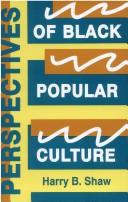
ISBN: 0879725044 Year: 1990 Publisher: Bowling Green (Ohi.) : Bowling Green State University popular press,
Abstract | Keywords | Export | Availability | Bookmark
 Loading...
Loading...Choose an application
- Reference Manager
- EndNote
- RefWorks (Direct export to RefWorks)
YERBY (FRANK) --- BARRETT (LINDSAY) --- CULTURE --- BROOKS (GWENDOLYN), 1917-2000 --- MARSHALL (PAULE), 1929 --- -MORRISON (TONI), 1931 --- -TOOMER (JEAN), 1894-1967 --- U.S. --- BLACKS
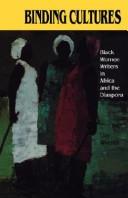
ISBN: 0253365856 Year: 1992 Publisher: Bloomington (IN) : Indiana University Press,
Abstract | Keywords | Export | Availability | Bookmark
 Loading...
Loading...Choose an application
- Reference Manager
- EndNote
- RefWorks (Direct export to RefWorks)
NWAPA (FLORA) --- SUTHERLAND (EFUA) --- WALKER (ALICE) --- AFRICAN LITERATURE --- LITERATURE --- AIDOO (AMA ATA), 1942 --- -MARSHALL (PAULE), 1929 --- -MORRISON (TONI), 1931 --- -WOMEN AUTHORS --- U.S. --- BLACK WOMEN

ISBN: 0761818758 Year: 2001 Publisher: Lanham, MD : University Press of America,
Abstract | Keywords | Export | Availability | Bookmark
 Loading...
Loading...Choose an application
- Reference Manager
- EndNote
- RefWorks (Direct export to RefWorks)
AMERICAN FICTION --- AFRO-AMERICAN AUTHORS --- CONDE (MARYSE) --- MERE DANS LA LITTERATURE --- MARSHALL (PAULE), 1929 --- -MORRISON (TONI), 1931 --- -WOMEN AUTHORS --- WOMEN AUTHORS --- MOI, TITUBA, SORCIERE NOIRE DE SALEM
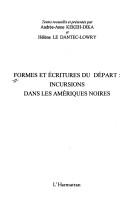
ISBN: 2738494056 Year: 2000 Publisher: Paris : L'Harmattan,
Abstract | Keywords | Export | Availability | Bookmark
 Loading...
Loading...Choose an application
- Reference Manager
- EndNote
- RefWorks (Direct export to RefWorks)
African Americans in literature. --- African Americans --- American literature --- Intellectual life. --- African American authors --- History and criticism. --- Hurston, Zora Neale --- Morrison, Toni --- Naipaul, V. S. --- Afro-american literature --- Black atlantic --- Marshall (paule), 1929 --- -Phillips (caryl), 1958 --- -Reed (ishmael) --- Slavery
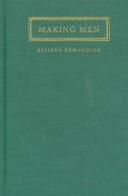
ISBN: 0822322633 Year: 1999 Publisher: Durham, N.C. Duke University Press
Abstract | Keywords | Export | Availability | Bookmark
 Loading...
Loading...Choose an application
- Reference Manager
- EndNote
- RefWorks (Direct export to RefWorks)
Colonialism left an indelible mark on writers from the Caribbean. Many of the mid-century male writers, on the eve of independence, looked to England for their models. The current generation of authors, many of whom are women, have increasingly looked-and relocated-to the United States. Incorporating postcolonial theory, West Indian literature, feminist theory, and African American literary criticism, Making Men carves out a particular relationship between the Caribbean canon-as represented by C. L. R. James and V. S. Naipaul, among others-and contemporary Caribbean women writers such as Jean Rhys, and Jamaica Kincaid, Paule Marshall, and Michelle Cliff, who now live in the United States. Discussing the canonical Caribbean narrative as it reflects national identity under the domination of English cultural authority, Belinda Edmondson focuses particularly on the pervasive influence of Victorian sensibilities in the structuring of twentieth-century national identity. She shows that issues of race and English constructions of masculinity not only are central to West Indian identity but also connect Caribbean authorship to the English literary tradition. This perspective on the origins of West Indian literary nationalism then informs Edmondson's search for female subjectivity in current literature by West Indian women immigrants in America. Making Men compares the intellectual exile of men with the economic migration of women, linking the canonical male tradition to the writing of modern West Indian women and exploring how the latter write within and against the historical male paradigm in the continuing process of national definition. With theoretical claims that invite new discourse on English, Caribbean, and American ideas of exile, migration, race, gender identity, and literary authority, Making Men will be informative reading for those involved with postcolonial theory, African American and women's studies, and Caribbean literature.
English literature --- Thematology --- Literary rhetorics --- Caribbean Area --- Caribbean area --- Littérature antillaise de langue anglaise --- Émigration et immigration --- Féminisme et littérature --- Impérialisme --- Colonies --- Narration --- Hommes --- Cliff, Michèlle (1940-....) --- James, Cyril Lionel Robert (1901-1989) --- Kincaid, Jamaica (1949-....) --- Marshall, Paule (1929-....) --- Rhys, Jean (1894-1979) --- Naipaul, Vidiadhar Surajprasad (1932-....) --- Femmes écrivains --- Histoire et critique --- Écrivains --- Dans la littérature --- Antilles
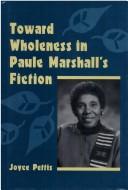
ISBN: 0813916143 Year: 1995 Publisher: Charlottesville, Va University Press of Virginia
Abstract | Keywords | Export | Availability | Bookmark
 Loading...
Loading...Choose an application
- Reference Manager
- EndNote
- RefWorks (Direct export to RefWorks)
American literature --- Psychological study of literature --- Marshall, Paule --- MARSHALL (PAULE), 1929 --- -FEMMES ET LITTERATURE --- ROMAN PSYCHOLOGIQUE AMERICAIN --- NOIRS AMERICAINS DANS LA LITTERATURE --- NOIRS AMERICAINS --- TOUT ET PARTIES (PHILOSOPHIE) --- PSYCHOLOGIE DANS LA LITTERATURE --- REGION CARAÏBE --- ETATS-UNIS --- 20E SIECLE --- HISTOIRE ET CRITIQUE --- PSYCHOLOGIE --- DANS LA LITTERATURE
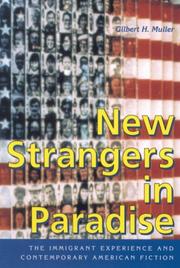
ISBN: 0813121345 0813184630 0813150132 Year: 1999 Publisher: Lexington, Ky University Press of Kentucky
Abstract | Keywords | Export | Availability | Bookmark
 Loading...
Loading...Choose an application
- Reference Manager
- EndNote
- RefWorks (Direct export to RefWorks)
New Strangers in Paradise offers the first in-depth account of the ways in which contemporary American fiction has been shaped by the successive generations of immigrants to reach U.S. shores. Gilbert Muller reveals how the intersections of peoples, regions, and competing cultural histories have remade the American cultural landscape in the aftermath of World War II.Muller focuses on the literature of Holocaust survivors, Chicanos, Latinos, African Caribbeans, and Asian Americans. In the quest for a new identity, each of these groups seeks the American dream and rewrites the story of what it
Sociology of minorities --- American literature --- Fiction --- anno 1900-1999 --- American fiction --- Emigration and immigration in literature --- Ethnic groups in literature --- Immigrants in literature --- Minorities in literature --- Minorities as a theme in literature --- Minority authors&delete& --- History and criticism --- Minority authors --- ROMAN AMERICAIN --- KINCAID (JAMAICA), 1949 --- -MARSHALL (PAULE), 1929 --- -20E SIECLE --- HISTOIRE ET CRITIQUE --- Minorities in literature. --- Ethnic groups in literature. --- Emigration and immigration in literature. --- Immigrants in literature. --- History and criticism.
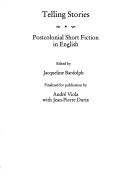
ISBN: 9042015349 900449071X Year: 2001 Publisher: Amsterdam Rodopi
Abstract | Keywords | Export | Availability | Bookmark
 Loading...
Loading...Choose an application
- Reference Manager
- EndNote
- RefWorks (Direct export to RefWorks)
English literature --- anno 1900-1999 --- Achebe, Chinua --- Atwood, Margaret --- Gordimer, Nadine --- Head, Bessie --- Mansfield, Katherine --- Rushdie, Salman --- Aidoo (ama ata), 1942 --- -Armah (ayi kwei), 1939 --- -Carey (peter), 1943 --- -Frame (janet), 1924-2004 --- Gallant (mavis), 1922 --- -Gunesekera (romesh) --- Jacobson (dan) --- King (thomas) --- Lawson (henry) --- Lovelace (earl), 1935 --- -Marshall (paule), 1929 --- -Mittelholzer (edgar) --- Munro (alice) --- Ndebele (njabulo) --- Osundare (niyi), 1947 --- -Rhys (jean), 1894-1979 --- Saro-wiwa (ken), 1941-1995 --- Selvon (samuel), 1923-1994 --- Senior (olive) --- Urquhart (jane), 1949 --- -Wilding (michael)
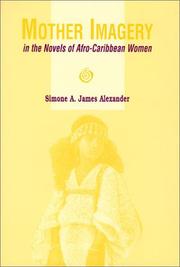
ISBN: 082621309X 082626316X 9780826263162 9780826213099 1417527005 9781417527007 Year: 2001 Publisher: Columbia London : University of Missouri Press,
Abstract | Keywords | Export | Availability | Bookmark
 Loading...
Loading...Choose an application
- Reference Manager
- EndNote
- RefWorks (Direct export to RefWorks)
Focusing on specific texts by Jamaica Kincaid, Maryse Condé, and Paule Marshall, this fascinating study explores the intricate trichotomous relationship between the mother (biological or surrogate), the motherlands Africa and the Caribbean, and the mothercountry represented by England, France, and/or North America. The mother-daughter relationships in the works discussed address the complex, conflicting notions of motherhood that exist within this trichotomy. Although mothering is usually socialized as a welcoming, nurturing notion, Alexander argues that alongside this nurturing notion there exists much conflict. Specifically, she argues that the mother-daughter relationship, plagued with ambivalence, is often further conflicted by colonialism or colonial intervention from the "other," the colonial mothercountry. Mother Imagery in the Novels of Afro-Caribbean Women offers an overview of Caribbean women's writings from the 1990s, focusing on the personal relationships these three authors have had with their mothers and/or motherlands to highlight links, despite social, cultural, geographical, and political differences, among Afro-Caribbean women and their writings. Alexander traces acts of resistance, which facilitate the (re)writing/righting of the literary canon and the conception of a "newly created genre" and a "womanist" tradition through fictional narratives with autobiographical components. Exploring the complex and ambiguous mother-daughter relationship, she examines the connection between the mother and the mother's land. In addition, Alexander addresses the ways in which the absence of a mother can send an individual on a desperate quest for selfhood and a home space. This quest forces and forges the creation of an imagined homeland and the re-validation of "old ways and cultures" preserved by the mother. Creating such an imagined homeland enables the individual to acquire "wholeness," which permits a spiritual return to the motherland, Africa via the Caribbean. This spiritual return or homecoming, through the living and practicing of the old culture, makes possible the acceptance and celebration of the mother's land. Alexander concludes that the mothers created by these authors are the source of diasporic connections and continuities. Writing/righting black women's histories as Kincaid, Condé, and Marshall have done provides a clearing, a space, a mother's land, for black women. Mother Imagery in the Novels of Afro-Caribbean Women will be of great interest to all teachers and students of women's studies, African American studies, Caribbean literature, and diasporic literatures.
Caribbean fiction (English) --- Women and literature --- American fiction --- African American women in literature. --- Mothers and daughters in literature. --- Motherhood in literature. --- Mothers in literature. --- Home in literature. --- Afro-American women in literature --- Literature --- Caribbean literature (English) --- English fiction --- Women authors --- History and criticism. --- History --- African American authors --- Marshall, Paule, --- Kincaid, Jamaica --- Condé, Maryse --- Condé, M. --- Richardson, Elaine Potter --- Criticism and interpretation. --- Marshall, Paule (1929-....) --- Kincaid, Jamaica (1949-....) --- Condé, Maryse (1937-....) --- Femmes et littérature --- Roman antillais de langue anglaise --- Mères --- Maternité --- Mères et filles --- Critique et interprétation --- Antilles --- 20e siècle --- Femmes écrivains --- Histoire et critique --- États-Unis --- Dans la littérature --- Thèmes, motifs --- Région caraïbe --- Conde, Maryse
| Listing 1 - 10 of 12 | << page >> |
Sort by
|

 Search
Search Feedback
Feedback About UniCat
About UniCat  Help
Help News
News